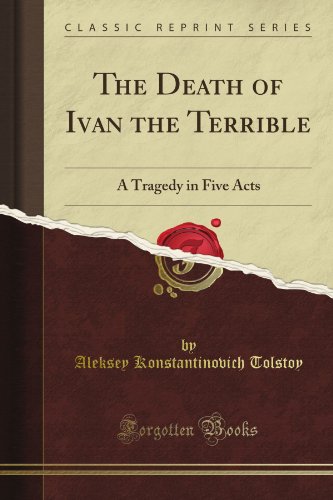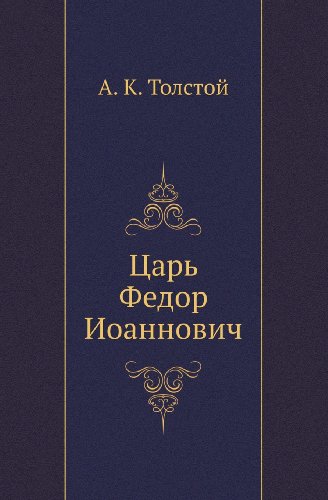Background
He was born in St. Petersburg, Russia on August 24, 1817.



(Instead of troubling the reader with a Preface of apology...)
Instead of troubling the reader with a Preface of apology and explanation, I shall attempt a brief historical sketch, which may, perhaps, assist him in forming a judgment of the Play. In doing so, I shall keep chiefly in view the person and character of I vanT heT errible, and shall avoid many details that would And their place in a fcdler historical account. After theM ongol era, the strength of which laated during the greater part of the thirteenth century, Moscow had gradually risen into importance, and the grandfather and fatier of I van, I van III. andY asili III., had put an end to that ruinous division of the country into separate and independent principalities, which, after being the chief cause of the success of the Tartars, had survived their fiall. When I van IV. (Typographical errors above are due to OCR software and don't occur in the book.) About the Publisher Forgotten Books is a publisher of historical writings, such as: Philosophy, Classics, Science, Religion, History, Folklore and Mythology. Forgotten Books' Classic Reprint Series utilizes the latest technology to regenerate facsimiles of historically important writings. Careful attention has been made to accurately preserve the original format of each page whilst digitally enhancing the aged text. Read books online for free at www.forgottenbooks.org
http://www.amazon.com/gp/product/B008IJ5Y06/?tag=2022091-20

(Aleksej Konstantinovich Tolstoj (1817-1875) - velikij rus...)
Aleksej Konstantinovich Tolstoj (1817-1875) - velikij russkij poet i pisatel' XIX v. Avtor populyarnyh i segodnya proizvedenij - romana 'Knyaz' Serebryanyj', dramy 'Tsar' Fedor Ioannovich', istoricheskih ballad, satiricheskoj poemy 'Istoriya gosudarstva Rossijskogoot Gostomysla do Timasheva', stroki iz kotoroj stali krylatymi. Na liricheskie stihi A.K.Tolstogo pisali muzyku P.I.Chajkovskij, N.A.Rimskij-Korsakov, S.V.Rahmaninov i drugie russkie kompozitory. Takie ego stihi, kak 'Sred' shumnogo bala...', 'To bylo ranneyu vesnoj...', 'Ne veter, veya s vysoty...', i drugie poluchili shirokuyu izvestnost' kak romansy. Ego proizvedeniya na istoricheskie temy soderzhat glubokie razmyshleniya o proshlom i buduschem Rossii, sohranivshie svoyu aktual'nost' do nastoyaschego vremeni.
http://www.amazon.com/gp/product/5458040961/?tag=2022091-20

(This scarce antiquarian book is a facsimile reprint of th...)
This scarce antiquarian book is a facsimile reprint of the original. Due to its age, it may contain imperfections such as marks, notations, marginalia and flawed pages. Because we believe this work is culturally important, we have made it available as part of our commitment for protecting, preserving, and promoting the world's literature in affordable, high quality, modern editions that are true to the original work.
http://www.amazon.com/gp/product/1162635592/?tag=2022091-20
He was born in St. Petersburg, Russia on August 24, 1817.
Aleksey Perovsky became Aleksey Konstantinovich's tutor. Aleksey had good teachers and at the age of six he fluently spoke French, German and English. Later he learned Italian as well. In December 1835 he completed exams (in English, French and German languages and literature, Latin, World and Russian history, and Russian statistics) at the University of Moscow for the formal 1st Grade State Bureaucrat certificate.
In 1834 Tolstoy enrolled in the Moscow Foreign Ministry State Archive as a "student", where he got his first taste of working with real historical documents. He soon embarked on a career in the Economic Affairs and Statistics Department in Saint Petersburg.
His two plays Tsar Fyodor, and Tsar Boris were for many years under the ban of the censor, for in Tsar Fyodor Tolstoy showed the tragic fate of the kindly Fyodor, who, pathetic in his desire to do good, was unable to find his way amid the troubled politics of the day and brought evil on all whom he desired to help.
In January 1837 Tolstoy became attached to the Russian Embassy in Frankfurt where he spent the next two years. The assignment was rather formal; it did not demand Tolstoy's presence in Germany and he spent most of his time in Saint Petersburg, leading a merry life. In late 1840 Tolstoy was transferred back to Russia to a position in the Tsar's Imperial State Chancellery 2nd Department where he continued to work for many years, slowly rising in the hierarchy.
Among his outstanding poems are St. John Damascene, in which he emphasizes the freedom of art, and the Dragon, a tale of Renaissance Italy. Tolstoy also composed a number of satires, among them a comic history of Russia, emphasizing the Russian search for order, and the Hero Potok, criticizing both the tyranny of Moscow and the absurdities of the radicals of his own day. In the same vein, Tolstoy and his cousins, Alexei and Vladimir Mikhailovich Zhemchuzhnikov, created the character and writings of Kozma Prutkov, one of the most amusing hoaxes in Russian literature. Prutkov was represented as a thoroughly limited bureaucrat with ambitions to become a writer; the tastelessness of his poems and his general stupidity satirically demolished the literary claims of many minor writers who were being overpraised by some of his contemporaries.
He was much criticized for his failure to join any of the social schools of the day, but his humane spirit, his high ideals, and the beauties of his work assure him of a high place in Russian literature.
Tolstoy represented the later period of Romanticism in Russian literature. He is best known for his ballads, based on Russian history; his historical novel, Prince Serebryany (1863), set in the time of Ivan the Terrible; and his dramatic trilogy (1866 - 1870): The Death of Ivan the Terrible, Tsar Fyodor, and Tsar Boris.
(Instead of troubling the reader with a Preface of apology...)
(Aleksej Konstantinovich Tolstoj (1817-1875) - velikij rus...)
(This scarce antiquarian book is a facsimile reprint of th...)
He was a supporter of the monarch. He also criticized the activities of the 3rd Department, and in the wake of the Polish uprising was one of the very few people in the Court to openly denounce Muravyov the Hangman's draconian methods of political repression. A fierce opponent of xenophobia, he saw Russia as a European country, and Russians as Europeans.
Tolstoy was a confirmed Westerner and perhaps appreciated better than any other Russian author the real significance of the Western belief in freedom and human dignity. He visualized this as existing in Kiev before the time of the Tatar invasions, and he contrasted this free and civilized existence, when Kiev formed part of the Western world, with the rigid tyranny of Ivan the Terrible and the system of Moscow, which still continued in his own day.
It was also in 1851 that Tolstoy first met Sophia Andreyevna Miller (1827?–1892), the wife of a cavalry colonel (whom she later divorced with great difficulty) and an impressively well-educated woman who knew fourteen languages, at a Bolshoy Theater masquerade. Tolstoy fell in love with her but had to wait for another twelve years before they were able to marry. All of his love lyrics from 1851 onwards were written for and about Sophia.
a Russian state assignation bank councilor
an illegitimate daughter of Count Aleksey Kirillovich Razumovsky
an author known under the pen name of Antony Pogorelsky
